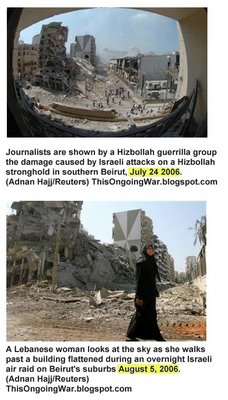 Democracy Project has some on-the-ball observations about the role of the media in distorting images and what this means for overall distortion and agenda-driven journalism:
Democracy Project has some on-the-ball observations about the role of the media in distorting images and what this means for overall distortion and agenda-driven journalism:The current exposure of Reuters’ clear bias in reporting on Israel continues with more photos photoshopped (see here, and here, for examples, and here for a current wrap-up), and its dispatch on the proposed draft resolution for the UN Security Council a misrepresentation of Lebanese views.
What needs to be understood is that these are neither passing errors but rather part and parcel of Reuters’ longstanding and insistent bias against Israel.
What needs to be understood is that this bias is a purposeful part of Reuters operating procedure and of its commercial strategy.
What needs to be understood is that U.S. newspapers are a major source of Reuters’ revenue, and Reuters’ credibility is enhanced by being carried in U.S. newspapers.
What needs to be understood, AND ACTED UPON, is that truth will not pressure Reuters to reform but only the complaints from these prime customers, the U.S. newspapers that pay for Reuters’ newswire.
Read the entire article - it's a gem.
Now we have a question. If it's called photoshopping (named in honor of Adobe's photo editing software) when a news-agency publishes doctored pictures that present a reality that never happened, what is it called when news-agencies doctor text reports, interviews, analysis? You can place two pictures side by side, as LGF has done and anyone can see the act of fraud.
Words don't work like that, which is why we think there is so much distortion, so much spinning and lying and logic-inverting. And since there's no simple software for detecting twisted analysis, we have to rely on good sense and information as well as on analytic watchdogs like Camera, Honest Reporting and other reputable sources to highlight them. As Democracy Project points out, the spinners and distorters will not change course unless pressured by us - their customers, readers and viewers. They suggest a strategy for responding to the media channels who buy Reuters' news products (here's a site which lists them) by writing to the ombudsman or reader representative or editor, with this text as a model:
I depend upon your newspaper for reliable information. Your use of Reuters’ reports and photos on the current Israel-Hezbollah war, which have been proven false and irresponsible, undermines my confidence. These are not exceptions for Reuters but part of a longstanding bias, as documented for example by CAMERA. Please convey to Reuters your requirement that Reuters publicly investigate the current failures of journalistic standards, reveal the results and its specific personnel and reporting procedures reforms. Please also convey to Reuters that your newspapers’ continued clientage is dependent upon the open thoroughness of this minimal responsibility to be depended upon by you. I will be watching to see whether I can depend upon you to deliver quality journalism by demanding this of your newswires.
Makes sense to us.

1 comment:
here's another for you:
http://eureferendum.blogspot.com/2006/08/qana-directors-cut.html
Post a Comment